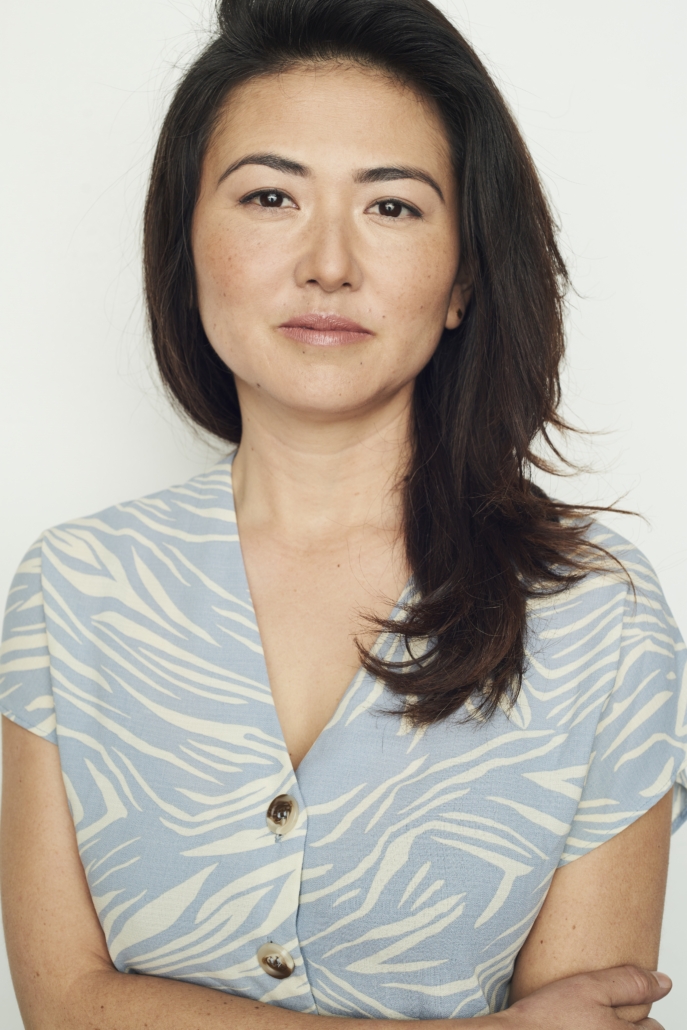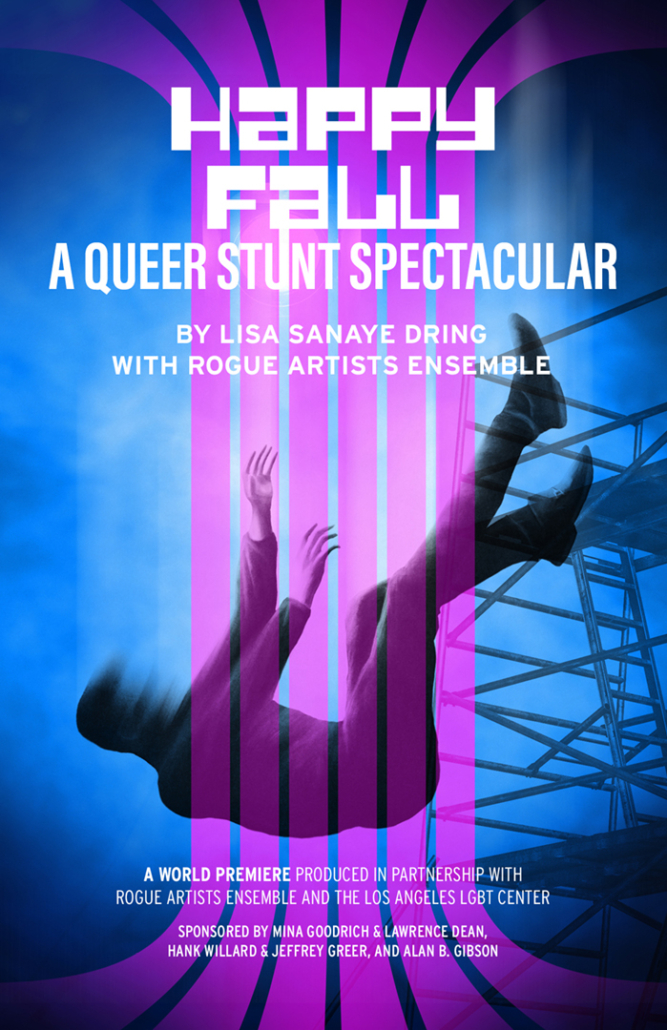Meet Lisa Sanaye Dring
Lisa Sanaye Dring is a writer and director from Hilo, Hawaii and Reno, Nevada. Her play SUMO was produced by La Jolla Playhouse and Ma-Yi Theater Company in 2023 and The Public with Ma-Yi in 2025. She was the 2024 Tow Foundation Writer-in-Residence with Ma-Yi. Her play Kairos is receiving a Rolling World Premiere with NNPN. Lisa has won an Edgerton Award, Broadway World Award, and PLAY LA Stage Raw/Humanitas Prize. They’ve been a finalist for the Relentless Award, O’Neill Playwrights’ Conference (2x), Seven Devils Playwrights Conference, and a 2x finalist (one honorable mention) for the Bay Area Playwrights Festival. Fellowships include MacDowell, Blue Mountain Center, and Yaddo. They received an Emmy nomination for Outstanding Interactive Programming for co-writing and co-directing a project with Matt Hill.
Interview with the Playwright
Conducted and edited by Sharon J. Anderson
CATF: The “high fall” in the industry is described as the most dangerous stunt of all the stunts; fraught with danger and excitement not unlike, as you have said, “the journey of love.” Why a love story in the context of two queer Hollywood stuntmen?
LSD: “Happy fall” can also mean a horrible thing that’s really wonderful, or it’s a bad thing that’s really great. There’s a paradox inside of stunts because they are dangerous, but they are done safely to make it look like someone is actually in danger. As safe as you try to make it, it’s still quite physically dangerous. The love in this play is a thing that is so beautiful, and toxic, and hard. One person may see love as a way to freedom — this access to sovereignty and joy — while another person is simply afraid.
Why did you choose to tell this story so visually, through live stunts, video, cinematic illusions, and puppetry?
I make theater because it is based in the body, which is a corporeal aesthetic experience.
My play is physical and visual because that’s the way we make theater. Our bodies enhance our thoughts and our feelings. In many ways, my play is a love letter to L.A. and Hollywood, which explains the use of technology and screens. Puppetry captures the idea of “the double.” The stunt people are doubles for the famous bodies, and the puppets are doubles for the bodies of the stunt people. The reasons for these different ways of presenting my play are discreet; they all have their own reasons.
In your play, you write, “Violence happens at the end of language. Just like sex. When words just can’t do it anymore. Our bodies have to touch.”
What is it in the world that could push you to resort to violence is something that I’m thinking about a lot, especially in the world we’re living in now. There’s that guttural need, but also that passion. Eros holds sexuality, but it also holds passion, drive, love, and this physical magnetism. I’m essentially looking at eros, which is that which the body wants or needs that the mind is not driving. Words in that way are a metaphor for logical, rational thought and exploration; and that which we know of ourselves that is in our control or known to us. Carl Jung talks about the “shadow,” so I think the body is part of the shadow; part of non-rational consciousness. There’s energy in the shadow, so in a play I am always trying to see that boundary of that which we know and that which is totally unknown and foreign which is us.
You started this play seven years ago. How has it changed over seven years?
This play has gone through so many drafts, and it’s been beautiful to live with it for that long. Originally, I wanted it to be a two-hander with just two people. In many ways, I started this when I was just starting to call myself a writer, so it’s grown up as I’ve grown up. As I put on more plays in the past few years, I try to get better. But this play is still a mystery for me, because it really can’t be found until you’re embodying it.
Your play Sumo at the Public Theater in New York featured sumo wrestlers – why these plays about men?
I’m writing as many plays about men as about women, but my male plays are getting produced.
I hope the others get produced. The question I have is, “are these plays better because they are my shadow and I’m not as close to them?” I’m interested in men. I don’t understand men and am curious about them, but my work is not as gendered as it may seem. I have faith that all my female, non-binary plays will get produced as well.
You said in an interview: “All of my plays are secretly about capitalism. The verticality of power versus the horizontal connection in power; a society based on subjugation and oppression.”
Personally, capitalism is a hegemonic lens for me. It’s the way I see the world, and it’s also the thing that causes me and our community a lot of stress. By capitalism, I mean this idea of expansion based on subjugation and oppression; the denial of the ebbs of life and interest in conquering others for personal gain. Capitalism feels like a knot, at least in the way I see the world. It’s there and I’m trying to untie that knot for myself and hopefully share my thoughts and feelings around that with others. I’m not trying to see it as “other.” We created it. It’s really something that we made up and are working with. I’m trying to figure out what in me has resonance with that in my chosen field so we can see it as something that doesn’t devour us, but something we can reframe, should we desire.
You have said, “I want to provide a space for sacred and profane things.” Is this play that kind of space?”
If the profane is in your work, the sacred is also your work because the work can be a temple for that which you love. But when your interpersonal love becomes more important or bigger than the temple of the work that you do, you should be able to see the love; identify that which is the greater love in your life and pursue that. The character, Clay, in my play, should give up his love of his career for the love of his partner, because it is bigger and more important. He’s not able to stop worshipping his career. I don’t think sacred and profane are all that different. It has to do with that which is the body seen as profane and that which is spirit seen as sacred – it’s the Cartesian split; the transcendent ideologies versus ideologies based on immanence. Anything can become sacred and anything can become not sacred. That which is sacred is ineffable and can’t be changed, so you need to change your life according to this quiet whisper of the things that can’t be named.
“Writing is my deepest well,” you have said, “where most of my energy is . . . things about the way I was raised led me to inhabit a silence, so I had to describe my voice as a writer and found language in the dramatic arts; not just a tool to express myself, but also a tool to find meaning; a way to understand and shape the world.”
I became a writer because of my parents’ deaths and in some ways that happening in my twenties propelled me to write. In theater, we can talk about the proximity to death in a way that other art forms can’t, because it’s so ephemeral and goes away in a very palpable way. I didn’t live in a very safe household as a child so there were things that were unsaid. I came into this work as an actor first because it was a place for me to be safe and in my body and for me to be intimate — not necessarily physically intimate but in a container that felt safe. The desire to be seen was also underneath all of this. I get tremendous joy from writing. It feels like the truer part of me than the part of me that goes out in the world. You’re in your body and you’re in your world and you realize, “This is why you are here!” It’s like surfing when you catch a wave. I am grateful that I have this personal practice that gives me access to myself and others in a profound way.
Herman Hesse said, “Everything becomes a little different as soon as it is spoken out loud.”
Once you tell someone that you love them for the first time, it really changes the feeling. Before something is out in the world, it is in its infinite stage of potential. That’s actually what this play is about. It’s the “eternal youth” thing. Clay is getting older and is not accepting it, as are many actors, I find. The thing about puer or eternal youth is that you live in infinity because you haven’t done anything in this world and possibility is so big that in choosing your path, you lose possibility and some of those things die. Some of that infinite potential goes away when you actually enact your life and that’s why so many people get stuck, because they are afraid of the death that happens when you make a choice. In many ways, this play is about a man who has passed his puer stage, but is unable to give up this idea of “Hollywood, infinite potential, I can be everything. I am strong.”
You have cited the last lines of Herman Hesse’s poem, “Stages” from The Glass Bead Game as among your favorites: “And life may summon us to newer races./So be it heart: bid farewell without end.”
Let life take you where it wants to go. I’m so grateful for the things I’ve had to let go of. I think theater asks you for something that is a little more than you have. It asks 100% of you and from that comes something new. That alchemy is such a blessing.
I am asking each playwright to comment on this line – a recurring theme — from Samuel Beckett’s novel, The Unnamable: “Words are all we have.”
Words are in some way our primary technology. 1.25 million years ago, we got fire and our mandibles got smaller so we could chew smaller things and our brains got bigger. Then we could make words. This technology is inherently human, because fire enabled us to have the brains we have. One of the first things we did with this technology was emit sounds to one another, and that is so beautiful.


